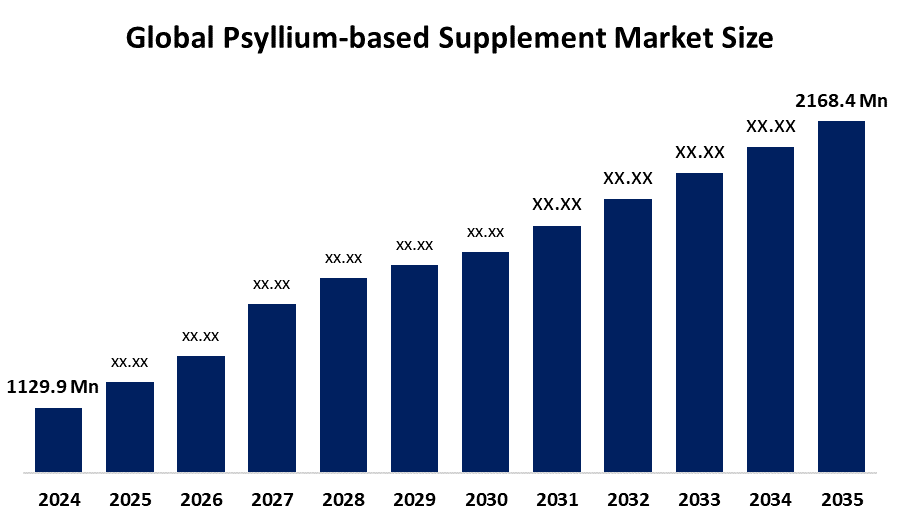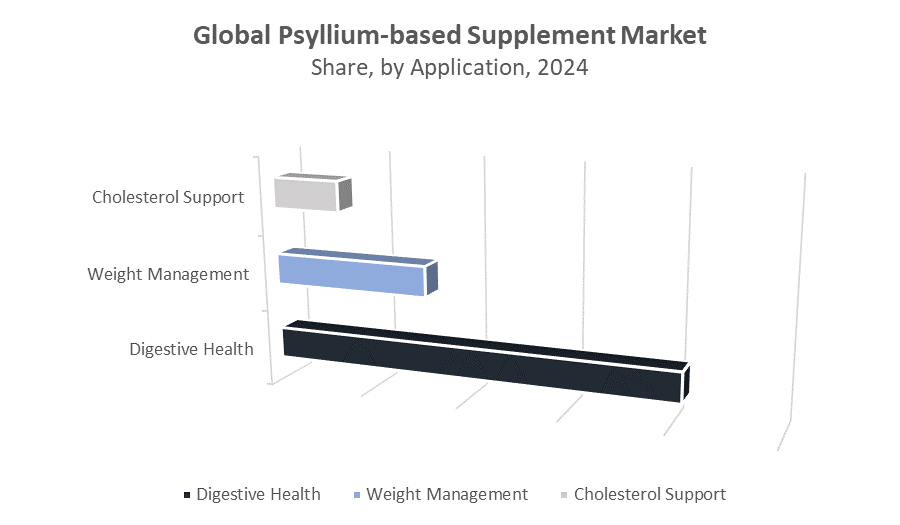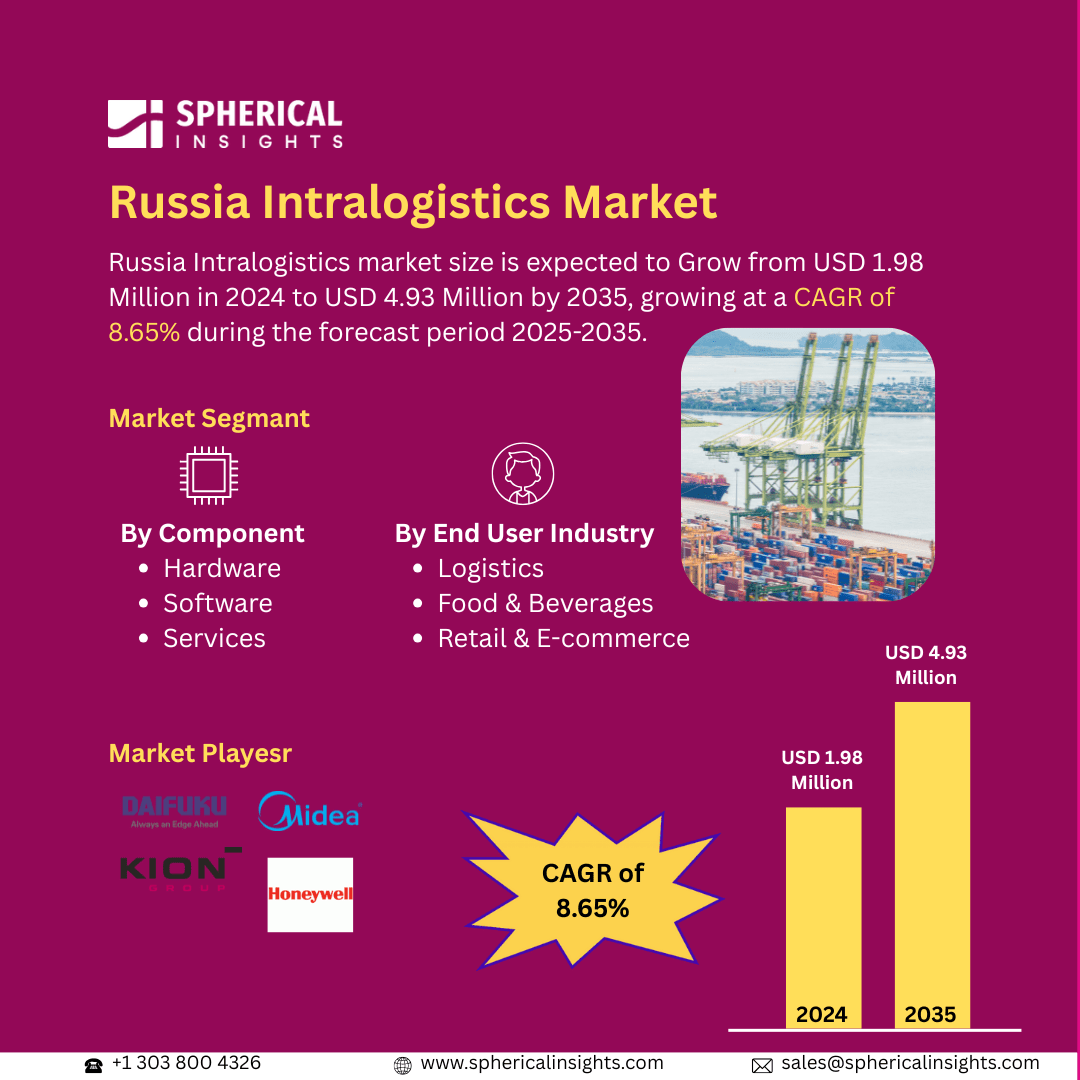Psyllium-based Supplement Market Summary, Size & Emerging Trends
According to Spherical insights , The Global Psyllium-based Supplement Market Size is expected to Grow from USD 1129.9 Million in 2024 to USD 2168.4 Million by 2035, at a CAGR of 6.11% during the forecast period 2025-2035. Increasing awareness of digestive health, rising obesity rates, and growing demand for natural dietary supplements are key driving factors for the psyllium-based supplement market.
Key Market Insights
- Asia Pacific is expected to account for the largest share in the psyllium-based supplement market during the forecast period.
- In terms of form, the powder segment dominated in terms of revenue during the forecast period.
- In terms of application, the digestive health segment accounted for the largest revenue share in the global psyllium-based supplement market during the forecast period.
Global Market Forecast and Revenue Outlook
- 2024 Market Size: USD 1129.9 Million
- 2035 Projected Market Size: USD 2168.4 Million
- CAGR (2025-2035): 6.11%
- Asia Pacific: Largest market in 2024
- North America: Fastest growing market

Psyllium-based Supplement Market
The psyllium-based supplement market centers on products made from Plantago ovata seeds, valued for their high soluble fiber content. These supplements support digestive health by regulating bowel movements, aid weight management through appetite control, and help lower cholesterol, promoting cardiovascular well-being. Rising global awareness of natural and plant-based supplements has boosted their popularity among health-conscious consumers. Preventive healthcare initiatives by governments and health organizations further encourage dietary fiber consumption, increasing demand for psyllium-based products. As interest in wellness, gut health, and natural remedies grows, the market for these supplements is expanding steadily. Both powders and capsules are increasingly adopted due to convenience and versatility, making psyllium a key component in functional foods, nutraceuticals, and dietary supplement portfolios worldwide. This combination of health benefits and consumer preference drives sustained market growth.
Psyllium-based Supplement Market Trends
- Growing adoption of plant-based and natural supplements over synthetic alternatives.
- Increasing consumer awareness regarding digestive health and cholesterol management.
- Companies launching innovative product formulations in powder and capsule forms to meet varying consumer preferences.
Psyllium-based Supplement Market Dynamics
Driving Factors: Rising health awareness and increasing prevalence of digestive, obesity, and cardiovascular disorders
Key growth factors for the psyllium-based supplement market include rising health consciousness among consumers and increasing cases of digestive disorders, obesity, and cardiovascular diseases. Psyllium’s proven benefits for regulating bowel movements, managing cholesterol, and supporting weight management drive adoption in preventive healthcare. Additionally, the global shift toward natural and plant-based dietary supplements strengthens market demand, as consumers increasingly prefer products with minimal side effects. Health organizations and governments promoting dietary fiber intake further support the expansion of the psyllium-based supplement market worldwide.
Restrain Factors: Fluctuating raw material prices and competition from alternative fibers
Restraining factors in the psyllium-based supplement market include fluctuations in the price and availability of raw psyllium husk, which can impact production costs. Regulatory hurdles in dietary supplements across different regions may also restrict market growth. Moreover, competition from alternative fiber sources, such as inulin, flaxseed, and other soluble fibers, limits market penetration and consumer adoption. Challenges in awareness and distribution in certain regions further constrain the market’s expansion.
Opportunity: Development of innovative formulations and expansion into emerging markets
The psyllium-based supplement market presents significant opportunities for growth. Developing flavored, ready-to-consume formulations and convenient delivery formats can attract a wider consumer base. Expansion into emerging economies with rising health awareness provides new revenue streams. Partnerships with pharmaceutical and nutraceutical companies can enhance distribution networks, enable co-branded products, and increase market penetration. Growing interest in gut health, weight management, and natural preventive solutions further supports the development of innovative products, offering strong growth potential.
Challenges: Supply chain disruptions and inconsistent product quality
Challenges in the psyllium-based supplement market include disruptions in the supply of psyllium husk, which may affect production timelines and cost stability. Maintaining consistent product quality is critical, as consumers expect standardized fiber content and efficacy. Market penetration in regions with low awareness of dietary fiber benefits requires education campaigns, which can be resource-intensive. Additionally, competition from alternative supplements and regulatory compliance adds complexity, creating barriers for new entrants and existing players seeking to scale operations.
Global Psyllium-based Supplement Market Ecosystem Analysis
The global market ecosystem consists of key raw material suppliers (mainly psyllium husk producers), manufacturers producing powders and capsules, distributors, and end-users including individuals, hospitals, and dietary supplement retailers. Regulatory bodies monitor compliance with dietary supplement standards to ensure product safety and efficacy. Collaboration between suppliers, manufacturers, and healthcare professionals is critical for market expansion and adoption.
Global Psyllium-based Supplement Market, By Form
The powder segment dominated the psyllium-based supplement market in terms of revenue, accounting for approximately 60% of the global market share. Powdered psyllium is highly preferred because it can be easily incorporated into beverages, smoothies, bakery products, and functional foods, offering versatile applications for both consumers and manufacturers. Its cost-effectiveness and ease of formulation make it the most commercially viable option for large-scale production. Additionally, consumers appreciate the flexibility to adjust dosages and integrate psyllium powder into their daily dietary routines, further driving its dominance in the market.
The capsule segment accounted for roughly 40% of the global market share, reflecting strong adoption among health-conscious consumers seeking convenience. Capsules offer precise dosage, easy portability, and a ready-to-consume format, making them highly popular among working professionals, urban populations, and frequent travelers. The increasing preference for time-saving, hassle-free supplementation supports the growth of this segment. Furthermore, manufacturers are launching innovative capsule formulations, including plant-based and vegan options, which enhance the segment’s appeal and encourage wider adoption.
Global Psyllium-based Supplement Market, By Application
The digestive health segment held the largest revenue share, accounting for approximately 50% of the global psyllium-based supplement market. This dominance is attributed to the widespread use of psyllium for relieving constipation, regulating bowel movements, and improving overall gut health. Growing awareness of digestive wellness and preventive healthcare has significantly boosted demand. Consumers increasingly prefer natural dietary fibers like psyllium to manage digestive issues without relying on synthetic laxatives, making this segment the primary revenue driver in the market.

The weight management segment accounted for roughly 30% of the market share, reflecting increasing use of psyllium-based products for appetite suppression and calorie control. Psyllium expands in the stomach, promoting satiety and reducing overall food intake, which appeals to health-conscious consumers and those pursuing weight loss programs. The rising prevalence of obesity and focus on preventive nutrition have further supported the growth of this segment, making it an important contributor to market expansion.
Asia Pacific: Largest market driven by dietary supplement awareness
Asia Pacific accounted for the largest share of the global psyllium-based supplement market, holding approximately 45% of total revenue. The region’s dominance is supported by growing awareness of dietary supplements, a rising health-conscious population, and strong traditional medicine practices in countries like India, China, and Japan. Increasing consumer preference for natural, plant-based solutions for digestive health, weight management, and cholesterol control further fuels demand. Government initiatives promoting preventive healthcare and nutritional well-being also contribute to the region’s leading position in the market.
India is projected to grow at a CAGR of 10% during the forecast period, driven by the expansion of retail and e-commerce channels for dietary supplements and rising awareness of fiber’s health benefits. Urbanization, lifestyle changes, and government campaigns promoting healthy diets are boosting adoption of psyllium-based products. Southern regions, particularly states like Tamil Nadu and Maharashtra, are witnessing accelerated demand due to growing industrialization and wellness initiatives.
North America is anticipated to register a notable CAGR of 18%, supported by the wellness trend, adoption of preventive healthcare practices, and increasing consumer preference for natural fiber supplements. Rising demand for convenient, ready-to-consumer products like capsules and flavored powders is driving growth in the region.
The United States is a key contributor to North America’s market expansion, showing strong growth in both retail and e-commerce channels. Health campaigns promoting fiber intake, combined with increasing consumer interest in digestive health, weight management, and heart health, are supporting steady adoption of psyllium-based supplements. The U.S. market benefits from advanced distribution networks and widespread awareness of the benefits of dietary fiber, ensuring consistent demand.
WORLDWIDE TOP KEY PLAYERS IN THE PSYLLIUM-BASED SUPPLEMENT MARKET INCLUDE
- Now Foods
- Nature’s Way
- Organic India
- Himalaya Global Holdings
- GNC Holdings, Inc.
- NutraScience Labs
- Vitasprint
- Baidyanath
- Sabinsa Corporation
- Herbalife Nutrition Ltd.
- Others
Product Launches in Psyllium-based Supplement Market
- In June 2023, Organic India introduced a flavored psyllium husk powder in the Indian market, focusing on digestive health and weight management. This launch aims to cater to the growing consumer demand for convenient, plant-based dietary supplements that can be easily incorporated into beverages, smoothies, and functional foods. The flavored formulation enhances palatability, making it more appealing to health-conscious consumers, particularly in urban regions with rising awareness of fiber’s health benefits.
- In January 2024, GNC launched psyllium capsules enriched with probiotics in North America, targeting enhanced gut health. The addition of probiotics complements the natural benefits of psyllium, improving digestion and promoting a balanced gut microbiome. This product is designed for convenience, offering precise dosing and ready-to-consume formats that appeal to busy professionals and consumers seeking preventive healthcare solutions. Such innovations reflect a growing trend in the market towards functional and value-added psyllium-based supplements.
Market Segment
This study forecasts revenue at global, regional, and country levels from 2020 to 2035.Spherical insights has segmented the psyllium-based supplement market based on the below-mentioned segments:
Global Psyllium-based Supplement Market, By Form
Global Psyllium-based Supplement Market, By Application
- Digestive Health
- Weight Management
- Cholesterol Support
Global Psyllium-based Supplement Market, By Regional Analysis
- North America
- Europe
- Germany
- UK
- France
- Italy
- Spain
- Russia
- Rest of Europe
- Asia Pacific
- China
- Japan
- India
- South Korea
- Australia
- Rest of Asia Pacific
- South America
- Brazil
- Argentina
- Rest of South America
- Middle East & Africa
- UAE
- Saudi Arabia
- Qatar
- South Africa
- Rest of the Middle East & Africa





